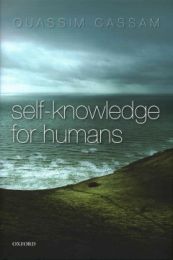| Online: | |
| Visits: | |
| Stories: |

| Story Views | |
| Now: | |
| Last Hour: | |
| Last 24 Hours: | |
| Total: | |
Skeptics and Believers: A book you should read
Sunday, August 2, 2015 12:18
% of readers think this story is Fact. Add your two cents.
Quassim Cassam’s Self-Knowledge for Humans [Oxford University Press] is reviewed by Richard Moran for the 7/10 issue of the Times Literary Supplement.
The book deals with how “blind we are to ourselves” pretty much and that it “should not be surprising about our error or ignorance concerning our own attitudes and feelings.”
Moran writes, “ … forms of ignorance of oneself are more consequential for a person’s rationality that ignorance of the world around us”; that is, “knowing what we believe or what we want is just as much based on inference and observation as is knowing what another person may believe or want, even if the bases for such inferences in one’s own case will often be sources of evidence … which are not available to another person. This position is known as ‘inferentialism.’”
“ ‘Transparency Condition’ [is a topic] in recent discussions of self knowledge. This is the idea that in ordinary cases a person can answer a question about their own belief by reflecting on the object of their belief – what the belief is about – rather than needing to consult evidence about themselves of the sort they would rely on in reporting the beliefs of another person.”
Cassam takes the tack, in his book and in his belief system (I think) that philosophy is a lot of hokum (or woo, as Eric Wargo might have it), but Mr. Moran sees this position as flawed. He writes, “Philosophy is not obliged to vindicate every hope or expectation that may lead someone to it …”
Cassam, in his book, clarifies, or tries to, the idea that self-knowledge is just as dependent upon the vicissitudes of thought and introspection that is required to know what another is thinking or believing; that is, a personal transparency must be rendered just a stringently as that we require about (from) others.
When skeptics challenge believers, as is the case in ufological arenas, skeptics have got to know what their belief systems are compose of and infected by just as vibrantly as they expect believers to know their constituent elements of belief.
There are self-deceptions, complicated by philosophy’s ruminations self-knowledge and practical wisdom, as Mr. Moran opens his review with, going on to note “the ‘immediate certainties’ of subjective experience in Cartesian meditations, or in the unifying role of self-consciousness in Kantian and post-Kantian philosophy” exacerbated by the extent of “governing egoism” reflected in the themes of Christian meditation, as well as La Rochefoucauld and the later French moralistes.”
He [Moran] states, ruefully (I think) “ … we are blind to ourselves in many ways, about our deeper convictions, about what really moves us to act as do, about our own capacities and their limitations.”
Get the book or read, at least, the erudite review by Richard Moran [TLS, 7/10/15, I’ll have to get back to you. Page 28].
You’ll, then, no longer be able to pretend your views are unsullied by pristine self-knowledge, and you shall then be able to assess your opponents views objectively and with intellectual bonhomie.
RR
http://ufocon.blogspot.com – The UFO Iconoclast(s)
Source: http://ufocon.blogspot.com/2015/08/skeptics-and-believers-book-you-should.html




